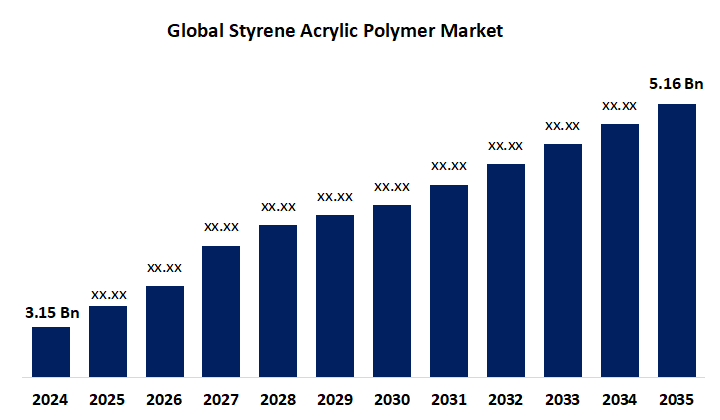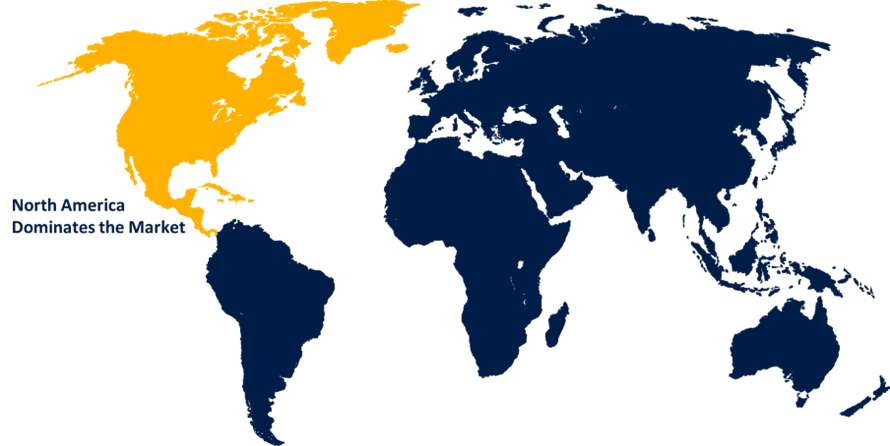Global Styrene Acrylic Emulsion Polymer Market Size, Share, and COVID-19 Impact Analysis, By Application (Opacifier, Binder, Adhesive, Construction Chemical, and Others), By End Use (Paper & Packaging, Building & Construction, Paints & Coatings, Cosmetics & Personal Care, and Others), and By Region (North America, Europe, Asia-Pacific, Latin America, Middle East, and Africa), Analysis and Forecast 2025 - 2035
Industry: Chemicals & MaterialsGlobal Styrene Acrylic Emulsion Polymer Market Insights Forecasts to 2035
- The Global Styrene Acrylic Emulsion Polymer Market Size Was Estimated at USD 13.05 Billion in 2024
- The Market Size is Expected to Grow at a CAGR of around 3.55% from 2025 to 2035
- The Worldwide Styrene Acrylic Emulsion Polymer Market Size is Expected to Reach USD 19.15 Billion by 2035
- Asia Pacific is expected to grow the fastest during the forecast period.

Get more details on this report -
The global styrene acrylic emulsion polymer market size was worth around USD 13.05 billion in 2024 and is predicted to grow to around USD 19.15 billion by 2035 with a compound annual growth rate (CAGR) of 3.55% from 2025 to 2035. An increasing need for construction materials, with rapid urbanization and industrialization, is driving the styrene acrylic emulsion polymer market globally.
Market Overview
The styrene acrylic emulsion polymer market refers to the industry emphasizing water-based polymers created by combining styrene and acrylic monomers. Styrene acrylic emulsion polymer has superior water resistance and moisture vapor transmission rate (MVTR) owing to its excellent hydrophobic characteristics. Further, its high glass transition temperature property is due to its durability, good abrasion resistance, and good mechanical properties. They have widespread application for coatings, adhesives, sealants, and elastomers (CASE). Upsurging consumer awareness about the harmful effects of solvent-based emulsions, along with an increasing demand for styrene acrylic emulsion polymer in the cosmetics and personal care industries, is primarily driving the market. Further, the polymer is used in packaging materials like envelopes, tapes, and labels, as well as in the cosmetics & personal care industry as an opacifier. An increasing awareness of bio-based emulsion polymers, along with the rising use of waterborne acrylic dispersion for anticorrosive coatings, is creating market growth opportunities for styrene acrylic emulsion polymer.
Report Coverage
This research report categorizes the styrene acrylic emulsion polymer market based on various segments and regions, forecasts revenue growth, and analyzes trends in each submarket. The report analyses the key growth drivers, opportunities, and challenges influencing the styrene acrylic emulsion polymer market. Recent market developments and competitive strategies such as expansion, type launch, development, partnership, merger, and acquisition have been included to draw the competitive landscape in the market. The report strategically identifies and profiles the key market players and analyses their core competencies in each sub-segment of the styrene acrylic emulsion polymer market.
Global Styrene Acrylic Emulsion Polymer Market Report Coverage
| Report Coverage | Details |
|---|---|
| Base Year: | 2024 |
| Market Size in 2024: | USD 13.05 Billion |
| Forecast Period: | 2025-2035 |
| Forecast Period CAGR 2025-2035 : | 3.55% |
| 2035 Value Projection: | USD 19.15 Billion |
| Historical Data for: | 2020-2023 |
| No. of Pages: | 225 |
| Tables, Charts & Figures: | 119 |
| Segments covered: | By Application, By End use, By Region |
| Companies covered:: | Celanese Corporation, Pexi Chem Private Limited., The Dow Chemical Company , Fuller, Acquos, Xyntra Chemicals B.V., The Lubrizol Corporation, and Others |
| Pitfalls & Challenges: | COVID-19 Empact, Challenges, Future, Growth, & Analysis |
Get more details on this report -
Driving Factors
The preference towards styrene acrylic emulsion polymer over solvent-based polymer, owing to its harmful effects, is driving the market demand. The use of styrene acrylic emulsion polymer for cosmetics and personal care products to enhance their texture, stability, and performance is contributing to the market growth. Further, the growing investment in the construction and industrial sector, with the rapid urbanization, is contributing to driving the styrene acrylic emulsion polymer market.
Restraining Factors
An increased cost of raw material, strict regulatory policies associated with VOC content are challenging the styrene acrylic emulsion polymer market. Further, the availability of alternative technology, including polyurethane dispersions in coatings, is hampering the market.
Market Segmentation
The styrene acrylic emulsion polymer market share is classified into application and end use
- The opacifier segment dominated the market with the largest revenue share in 2024 and is projected to grow at a substantial CAGR during the forecast period.
Based on the application, the styrene acrylic emulsion polymer market is divided into opacifier, binder, adhesive, construction chemical, and others. Among these, opacifier segment dominated the market with the largest revenue share in 2024 and is projected to grow at a substantial CAGR during the forecast period. Styrene acrylic emulsion polymer is used in the formulation of interior and exterior emulsion paints, primers, undercoats, putties, etc. that are applied in mineral substrates like monsonry, plaster, fibre cement, and concrete. The growing product demand from the superabsorbent polymer and adhesives, and sealants sectors is contributing to driving the market.
- The paints & coatings segment accounted for a dominant market share in 2024 and is anticipated to grow at a significant CAGR during the forecast period.
Based on the end use, the styrene acrylic emulsion polymer market is divided into paper & packaging, building & construction, paints & coatings, cosmetics & personal care, and others. Among these, the paints & coatings segment accounted for a dominant market share in 2024 and is anticipated to grow at a significant CAGR during the forecast period. Styrene acrylic polymers are primarily used as binders in water-based paints and coatings that offer several benefits such as good water resistance, durability, and cost-effectiveness. An increasing need for premium paints and technologically advanced coatings is contributing to driving the styrene acrylic emulsion polymer market.
Regional Segment Analysis of the Styrene Acrylic Emulsion Polymer Market
- North America (U.S., Canada, Mexico)
- Europe (Germany, France, U.K., Italy, Spain, Rest of Europe)
- Asia-Pacific (China, Japan, India, Rest of APAC)
- South America (Brazil and the Rest of South America)
- The Middle East and Africa (UAE, South Africa, Rest of MEA)
North America is anticipated to hold the largest share of the styrene acrylic emulsion polymer market over the predicted timeframe.

Get more details on this report -
North America is anticipated to hold the largest share of the styrene acrylic emulsion polymer market over the predicted timeframe. The growing commercial and residential construction industries, along with increasing government and private investment, are contributing to driving the market for styrene acrylic emulsion polymer. Further, an increasing awareness about water-based acrylic dispersion for anticorrosive and antimicrobial coatings is contributing to propel the market.
Asia Pacific is expected to grow at a rapid CAGR in the styrene acrylic emulsion polymer market during the forecast period. Increasing demand for paints and coatings with the growing building activity, especially in developing nations such as China, India, and Southeast Asia, is anticipated to drive the market. Further, its increasing adoption due to environmental benefits, unique properties, and application versatility is contributing to propel the market growth.
Europe is anticipated to hold a significant share of the styrene acrylic emulsion polymer market during the predicted timeframe. The stringent regulatory policies imposed by ECHA and EEA on the VOC emissions are propelling the styrene acrylic emulsion polymer market. Further, an increasing public infrastructure and increasing investments through public-private partnerships at the municipal level in countries like Germany are driving the regional market.
Competitive Analysis:
The report offers the appropriate analysis of the key organizations/companies involved within the styrene acrylic emulsion polymer market, along with a comparative evaluation primarily based on their type of offering, business overviews, geographic presence, enterprise strategies, segment market share, and SWOT analysis. The report also provides an elaborative analysis focusing on the current news and developments of the companies, which includes type development, innovations, joint ventures, partnerships, mergers & acquisitions, strategic alliances, and others. This allows for the evaluation of the overall competition within the market.
List of Key Companies
- Celanese Corporation
- Pexi Chem Private Limited.
- The Dow Chemical Company
- Fuller
- Acquos
- Xyntra Chemicals B.V.
- The Lubrizol Corporation
- Others
Key Target Audience
- Market Players
- Investors
- End-users
- Government Authorities
- Consulting And Research Firm
- Venture capitalists
- Value-Added Resellers (VARs)
Market Segment
This study forecasts revenue at global, regional, and country levels from 2020 to 2035. Spherical Insights has segmented the styrene acrylic emulsion polymer market based on the below-mentioned segments:
Global Styrene Acrylic Emulsion Polymer Market, By Application
- Opacifier
- Binder
- Adhesive
- Construction Chemical
- Others
Global Styrene Acrylic Emulsion Polymer Market, By End Use
- Paper & Packaging
- Building & Construction
- Paints & Coatings
- Cosmetics & Personal Care
- Others
Global Styrene Acrylic Emulsion Polymer Market, By Regional Analysis
- North America
- US
- Canada
- Mexico
- Europe
- Germany
- UK
- France
- Italy
- Spain
- Russia
- Rest of Europe
- Asia Pacific
- China
- Japan
- India
- South Korea
- Australia
- Rest of Asia Pacific
- South America
- Brazil
- Argentina
- Rest of South America
- Middle East & Africa
- UAE
- Saudi Arabia
- Qatar
- South Africa
- Rest of the Middle East & Africa
Need help to buy this report?